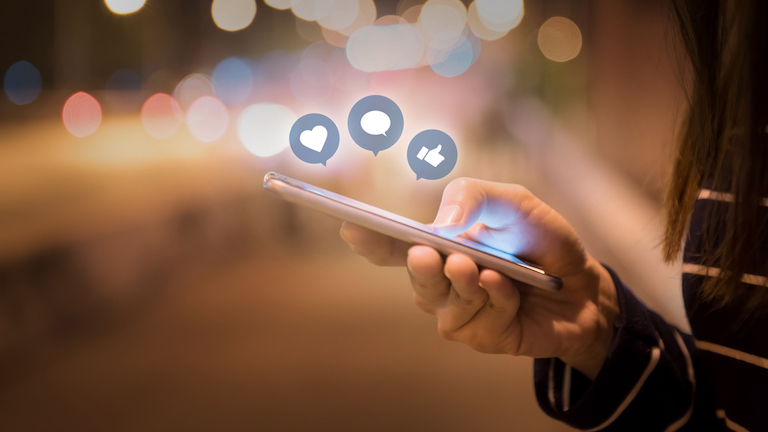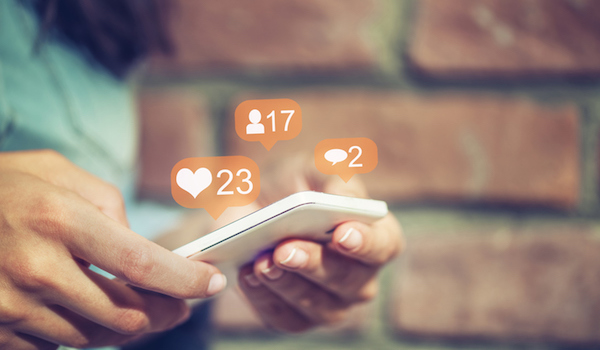Do you spend more time online than you do offline? CEO of UK Council for Psychotherapy Sarah Niblock offers her tips on how to spot and curb a social media addiction
An Ofcom report has revealed that the average Briton checks their phone every 12 minutes and spends around 24 hours a week online. It also showed the rapid growth of addiction to technology, as it found that only 12% of Britons said they never used the internet. The addiction to our phones was further highlighted by the fact that two in five British adults admitted to checking their phones within five minutes of waking up.
But enough drama. It’s the holiday season. Time to relax in the sun on a lounger with a cocktail and a scroll through social media. And who could blame you – it is an incredible modern phenomenon and a terrific way to stay connected with friends, family, favourite celebrities as well as keep up to date with all the news.
What seems like harmless fun and a healthy distraction from life’s stresses can actually change our brain and thought patterns, making us ill
But there’s growing, worrying evidence that over use of apps and platforms has a darker side, and can wreak havoc on our mental wellness.
This month, Instagram unveiled a new ‘all caught up’ feature in a bid to curb social media addiction. Going forward, users will get an alert when they have seen ‘all new posts from the past 48 hours’.
The company says the new feature is an attempt to help users combat compulsive online browsing and understand how much time they spend online.
This bears out a recent stat that people in their 20s and 30s check social media 157 times a day, on average.
It rings alarm bells among psychotherapists, who are increasingly concerned about the wellness of a generation already facing so much uncertainty and anxiety.
The chemistry of clicking can actually make us sadder and sadder over time, not happier. What seems like harmless fun and a healthy distraction from life’s stresses can actually change our brain and thought patterns, making us ill.
The trouble is, no-one can say how many minutes or hours online is good or bad for us – it really comes down to the individual and your circumstances. What might be OK for a singleton could be a real problem for a parent with a new baby to care for. Only you can know when it’s getting out of hand.
The great news is that there’s plenty of support out there to help you get a handle on it. Rather than it controlling you, you can make it a pleasurable positive part of your life.
Here are 8 signs you may be addicted to social media and how you can fix them.
1. You spend a lot of time when you’re offline thinking about getting back on social media
Do you feel ‘twitchy’ if you can’t check your status? That’s down to dopamine. Discovered in 1957, it is one of 20 or so major neurotransmitters, a fleet of chemicals that, like despatch riders weaving through traffic, carry urgent messages between neurons, nerves and other cells in the body. Without them, our hearts would stop beating and our lungs stop breathing. In dopamine’s case, it tells us to get a glass of water when we feel thirsty or have sex so our genes don’t die out.
But here’s the sticky bit. Inside the mid-brain, dopamine relates to the reward we receive for an action. And if that reward is met, the action can become a habit. So much so, British clinical psychologist Vaughan Bell once described dopamine as “the Kim Kardashian of molecules”.
When we don’t get the likes we crave, it is then that we get a dopamine plunge so we keep going back and back for gratification.
The trouble is that dopamine also drives down levels of another essential neurotransmitter, serotonin. Serotonin keeps us feeling content and it also tells us when we have had enough of something. Instead of a balanced supply of both, social media ‘hits’ renders our brain chemistry out of whack.
2. You feel urges to use social media more and more over time
It’s a compulsive urge that many of us find hard to resist. The reason for that is the sheer unpredictability of what you get in return. If we knew that every time we posted something we’d get 50 likes it would actually become quite boring.
When we don’t get the likes we crave, it is then that we get a dopamine plunge so we keep going back and back for gratification. As more dopamine enters our systems, so the feel-good-had-enough serotonin fades away.
3. You use social media as a distraction from personal problems
There’s nothing morally wrong with documenting your whole life on social media, but when you quit actually living your life, that’s when it becomes an issue. It’s so sad to see groups of friends together in a restaurant not speaking, but engrossed in their phones. It’s a vicious cycle – by looking at airbrushed images of perfection online making you feel inadequate when you could be living your life to your fullest potential, keeping fit and healthy and getting lots of genuine positive feedback from real people who care about you.
And I would hate for anyone to use social media to distract themselves from what is really worrying them. Like alcohol and drugs, apps temporarily disconnect us from our feelings of shame or anguish. But they don’t go away and may magnify if you ignore them.
4. You’ve regretted posting certain messages on social media
These online environments, with their ease of use and high scale, can encourage what is called the ‘online disinhibition effect’, which can cause people to behave in antisocial ways that they may not adopt in face-to-face meetings.
Those posts can oversimplify what are normally complex social relations. Across all social networks, the nuances of relating to another human are reduced.
This means that even on a more ‘friendly’ platform, such as Facebook, people tend to be sharper because they do not get the regular emotional feedback of the other person they are communicating with.
People need to be supported in finding meaningful and enriching ways to gain both connection and self-expression in a real social context, as opposed to relying on digital technology, which can never serve as a replacement.
5. You’ve tried to cut back on social media without success
It’s not surprising given how powerful the chemical pull is. It’s not a process you can easily embark on by yourself. It takes considerable willpower to detox and unless you know what you are really trying to distract yourself from, you may fail and feel even worse.
6. You feel bad about how much time you are spending pouring over nonsense
Scrolling though endless funny cat videos, or swiping through your ex’s holiday photos – it doesn’t matter what we’re looking at, we’ll find a way to become enthralled. Is it keeping you up too late so you don’t get enough sleep?
7. Your use of social media negatively affects your job, relationship or studies?
Psychotherapists all too often hear of clients facing unemployment due to ill-advised posting. Technology can also break down the usual barriers to sexual intimacy, making it easy to meet new people and have online encounters. Relationships and families can be devastated with far reaching effects on many people’s mental health as well as financial stability.
8. It’s the first thing you do in the morning and the last thing at night
You think you are seriously missing out over the course of a few hours sleep. If you want to be less dependent on your phone, you need to identify the source of your anxiety and you have to wean yourself off slowly by gradually spending more and more time away from your phone.
Start for just an hour, then maybe a dinner, then try not looking at it first thing every morning. Ask yourself why you are logging on – what are you getting from it? Is it making you happy and making your life more positive? Are the relationships you have with your online contacts fulfilling?
It’s necessary to learn controlled use rather than abstinence. In the connected world we live in, it is simply not feasible to prohibit someone from accessing all smart devices.
Ask yourself why you are logging on – Are the relationships you have with your online contacts fulfilling?
But that’s not easy on your own. You need the support of friends and family, even co-workers. It isn’t always easy to share a problem. That’s why talking with a trained accredited psychotherapist can really help to get through to the absolute root cause of why you can’t help logging on day and night. It may be something that dates back a long, long time, something you cannot even remember, but nonetheless remains an itch that you scratch though risky behaviours.
The key is not to go social cold turkey but to take a staged withdrawal with professional psychotherapeutic support – make sure they are regulated – and begin to build in real social interaction to fill the space. Pick up the phone, write a letter or just go out and meet up with people. Soon you’ll find out who your friends really are and the lure of those online buddies will swiftly decline.
Sarah Niblock is a professor and the CEO of the UK Council for Psychotherapy. To find a therapist visit psychotherapy.org.uk
Related Healthista Content
Is your Instagram making you ill?
6 reasons social media is making you unhappy (and what to do instead)
11 self-care tips these wellness experts want you to do daily
Like this article? Sign up to our newsletter to get more articles like this delivered straight to your inbox.
























































